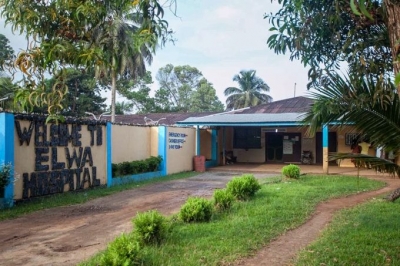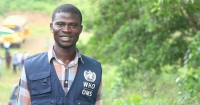
- Home
- About
- Campaigns
- PDA Radio
- Contact Us
- Downloads
- Join Us
- Donate
- Events
- Benefit Kitchen

Ebola Crisis (20)
Aid workers: Life and death in the time of Ebola
Written by Stuart Rintoul | The AustralianAlison Schafer is a trained psychologist working with the international humanitarian agency World Vision.
On January 12, she went to Sierra Leone from her home in Melbourne to work on the social, emotional and psychological effects of the Ebola epidemic, which during the past year has killed more than 10,250 people in Guinea, Liberia and Sierra Leone.
29 Deaths, 1 Survivor: How Ebola Ravaged Liberian Household
Written by Stephen D. Kollie | All Africa“Actually, when it started, we had the fear that it was Redemption Hospital. We felt that Redemption Hospital was not treated correctly and they were killing, so we sat in the house with the virus for one week and everything broke loose. We were waiting for Island clinic to open. So we in the house said that we will not go to Redemption until Island clinic can open”, Josephine Dolley, Ebola survivor
The recent outbreak of the Ebola virus epidemic in Guinea, Liberia and Sierra Leone has exposed the underbelly of many of Africa’s healthcare systems. They are often poorly funded, severely neglected and in some cases virtually nonexistent. The disease’s virulence has overwhelmed health systems that even before Ebola lacked basic equipment and facilities, medical staff and supporting infrastructure.
How Ebola Roared Back
Written by KEVIN SACK, SHERI FINK, PAM BELLUCK and ADAM NOSSITER | The New York TimesFor a fleeting moment last spring, the epidemic sweeping West Africa might have been stopped. But the opportunity to control the virus, which has now caused more than 7,800 deaths, was lost.
Doctors in Scotland confirm country's first Ebola case
Written by Doug Stanglin | USA TodayA health worker who just returned to Scotland from Sierra Leone has been diagnosed as the country's first Ebola case, Scottish authorities said Monday. The Scottish government said on its website that infectious-disease procedures have been put into effect, and the patient has been isolated and is being treated on the Gartnavel Hospital campus in Glasgow.
Liberia: Rejection By Hospitals Still Increasing Maternal Deaths
Written by Massa F. Kanneh | Yall AfricaLovetta Kamara, 26, died last Saturday after she developed complications due to delay in receiving medical attention in Monrovia after delivery.
Sierra Leone President Makes Ebola Plea to Chiefs
Written by CLARENCE ROY-MACAULAY Associated PressSierra Leone's president implored the country's traditional leaders on Thursday to stop cultural practices that have been blamed for spreading Ebola, like burials that involve touching corpses.
Liberia: Sharing his experience fighting Ebola
Written by Andrea Miller“People really doubted the fact that Ebola was real, until we heard about the first case in the hospital. I wasn’t one of those who doubted though. Because I am a student nurse, I had read about the Ebola virus before, how it was first discovered back in 1976.”
Radio Classroom: Bring Learning Back to the Ebola Zone
Written by Toni Collette | The Huffington PostFifteen-year-old Mada Karimu has not been to his school since it closed on July 18th. But he's still learning. All he needs is a notebook and a small radio, on which he listens to classes each day.
Obama To Get Most Of $6.2 Billion Request To Fight Ebola
Written by Andrew Taylor | AP | Huffington PostPresident Barack Obama will be awarded the bulk of his $6.2 billion request to fight Ebola in Africa, a senior member of the Senate Appropriations Committee said Thursday.
More...
The Great Ebola Race: Fast-Track Vaccine Effort Hits Potholes -- Real Ones -- in Africa
Written by Makiko Kitamura | BloombergDeep inside a drug manufacturing plant in an industrial district of suburban Rome, vials of Ebola vaccine sit in freezers, chilled to minus 70 degrees Celsius with the help of liquid nitrogen. Much warmer -- say, the temperature in outdated kerosene-fueled fridges in some West African villages -- risks destroying the drug.
Obama to tout progress on Ebola vaccine at NIH
Written by Sarah Ferris | The HillPresident Obama will speak at the National Institutes of Health (NIH) on Tuesday to tout progress on a much-needed Ebola vaccine that has shown promise in early trials.
Ebola crisis: Huge risk of spread - UN's Tony Banbury
Written by Mark Doyle | BBC NewsThe head of the UN Ebola response mission in West Africa has told the BBC there is still a "huge risk" the deadly disease could spread to other parts of the world. Tony Banbury declined to say if targets he had set in the fight against Ebola, to be achieved by Monday, had been met.
RNs at DC’s Providence Hospital to Strike November 12, Say Inadequate Ebola Preparedness, other Health, Safety Concerns Put RNs, Patients at Risk
Written by Corey Lanham | National Nurses UnitedWashington, DC-- Registered nurses at Providence Hospital in the District of Columbia, will hold a one-day strike on Wednesday, November 12 to protest the hospital’s refusal to address critical issues of health and safety concerns for patients and nurses as symbolized by inadequate Ebola preparedness













